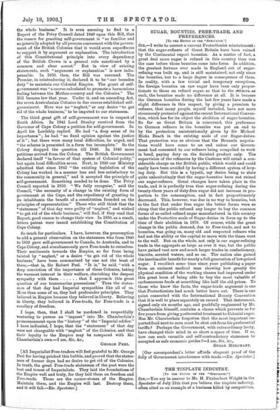SUGAR, BOUNTTRS, FREE-TRADE, AND PREFERENCES.
[To THE EDITOR OF rsz " SPZCTAT011.1 SIR,..4 write to correct a current Protectionist misstatement: that the sugar-refiners of Great Britain have been ruined by the Continental export bounties. As a matter of fact, a great deal more sugar is refined in this country than was the case before those bounties came into force. In addition, the greatest fortune ever made in England out of sugar- refining was built up, and is still maintained, not only since the bounties, but to a large degree in consequence of them. In reality, with a few trivial and temporary exceptions, the foreign bounties on raw sugar have been only propor- tionate to those on refined sugar, so that to the refiners, as such, the bounties made no difference at all It is because the German bounties during the last few years have made a slight difference in this respect, by giving a premium to refiners, that many people, myself included, have not more strenuously protested against the recent International Conven- tion, which has for its object the abolition of sugar-bounties. So far as Great Britain is concerned, this preference to German refiners in the bounties was put an end to by the protection unintentionally given by Sir Michael Hicks Beach in the existing scale of our Sugar-duties. That protection was so obvious that the Brussels negotia- tions would have come to an end unless our Govern- ment had consented to our refiners being compelled to work in bond, paying duty on the finished product only. The supervision of the refineries by the Customs will entail a con- siderable charge on the British public, which would and could easily have been avoided by having a different system of levy- ing duty. But this is a bypath, my desire being to state quite unhesitatingly that the sugar-bounties have not ruined our sugar-refiners. Great changes have taken place in the trade, and it is perfectly true that sugar-refining during the twenty-three years of duty-free sugar did not increase in pro- portion to the consumption, and in fact proportionately decreased. This, however, was due in no way to bounties, but to the fact that under free sugar the better forms were so cheap that the public refused any longer to bay the common forms of so-called refined sugar manufactured in this country under the Protective scale of Sugar-duties in force up to the time of their abolition in 1878. Of course, while the great change in the public demand, due to Free-trade, and not to bounties, was going on, many old and respected refiners who had not the ability or the capital to move with the times went to the wall. But on the whole, not only is our sugar-refining trade in the aggregate as large as ever it was, but the public have gained vast new and much larger trades in confectionery, biscuits, aerated waters, and so on. The nation also gained the inestimable benefit for nearly a full generation of low-priced sugar. I recollect some time since your publishing a paper from an eminent medical man showing how greatly the physical condition of the working classes had improved under this great boon of being able to buy the most valuable of carbonaceous foods at something like half the old prices. To those who know the facts, the sugar-trade argument is one that Protectionists had much better leave out. There is one point connected with the International Bounty Convention that it is well to place separately on record. That instrument, signed only six months ago, and pushfully engineered by Mr. Chamberlain himself, contains a clause which prevents us for five years from giving preferential treatment to Colonial sugar. Has Mr. Chamberlain forgotten that the most important im- ported food next to corn must be shut out from his preferential tariffs ? Perhaps the Government, with extraordinary levity, have changed their mind in so short a space of time. If so, how can such versatile and self-contradictory statesmen be accepted as safe economic guides P—I am, Sir, 8m.,
SUGAR MERCHANT.
[Our correspondent's letter affords eloquent proof of the folly of Government interference with trade.—En. Spectator.]










































 Previous page
Previous page